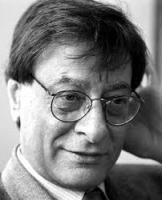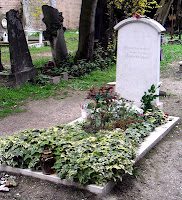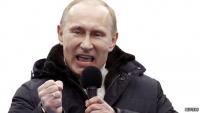March 13, 2012
Edited by David Sanders
Specimen Days
March 13, 2012
1395 – John Barbour, Scottish poet, is born.
1711 – Nicolas Boileau-Despréaux, French poet and critic (b. 1636), dies.
1822 – Moritz Grave von Strachwitz, German poet, is born.
1897 – Marcel Thiry, Belgian poet (Statue of Fatigue), is born.
1899 – Jan Lechoń, Polish poet (d. 1956), is born.
1927 – Charles Sickman Corsen, Dutch Antillean poet, is born.
1941 – Mahmoud Darwish, Palestinian prominent poet and writer of prose.(d. 2008), is born.
1941 – Elizabeth Madox Roberts, American poet and novelist (b. 1881), dies.
1960 – Yuri Andrukhovych, Ukrainian writer, poet and political essayist, is born.
 Our cups of coffee. Birds green trees
Our cups of coffee. Birds green trees
In the blue shade, the sun gambols from one wall
To another like a gazelle
The water in the clouds has the unlimited shape of what is left to us
Of the sky. And other things of suspended memories
Reveal that this morning is powerful and splendid,
And that we are the guests of eternity.
—from “Under Seige” by Mahmoud Darwish, 1941–2008
Poetry In The News
Poetry is Coming to London’s Olympic Park
Poetry will have a place at this summer’s Olympic Games in London thanks to the Winning Words program, conceived of by National Poetry Day founder William Sieghart. Sieghart is working with London’s Olympic organizing groups to display poetry throughout the city’s Olympic Park. The project aims to bring some of the history of the park to life while also drawing attention to poetry itself. Read more at Huffington Post.
With a Digital Reissue, the Experimental ’60s Spoken Word Series Poetry Out Loud Looks Back on a Revolution
 In the popular imagination, at least, where there is little room for poets in the first place, the Beats are probably the best known of the writers who came of age in the ’60s. But even the most famous Beat poet — he of “Howl,” witness to the best minds of his generation and all the rest — was too square for one of the most out-there literary series of its time. Poetry Out Loud, an audio “magazine” consisting of privately pressed LPs recorded and released between 1969 and 1977, never strayed from its vision — no matter who came knocking. “We all had long discussions about what was poetry,” says Patricia “Bebe” McGarry. “We all came to the conclusion that it had to go off the page.” Read more at Nashville Scene.
In the popular imagination, at least, where there is little room for poets in the first place, the Beats are probably the best known of the writers who came of age in the ’60s. But even the most famous Beat poet — he of “Howl,” witness to the best minds of his generation and all the rest — was too square for one of the most out-there literary series of its time. Poetry Out Loud, an audio “magazine” consisting of privately pressed LPs recorded and released between 1969 and 1977, never strayed from its vision — no matter who came knocking. “We all had long discussions about what was poetry,” says Patricia “Bebe” McGarry. “We all came to the conclusion that it had to go off the page.” Read more at Nashville Scene.
World Poetry
The Feminist Poets of Mumbra
Australia’s richest person, the mining magnate Gina Rinehart, has been ridiculed for penning an anti-government poem that rhymes “rampant tax” with “political hacks” and pleads for “special economic zones”. The poem, a sort of ode to mining titled “Our Future”, has been engraved on a plaque fixed to a 30-ton iron ore boulder as part of a new outdoor artwork in the billionaire’s home state of Western Australia. Read more at the Telegraph.
New Books
Raptor by Andrew Feld
[Paperback] University of Chicago Press, 88 pp., $18.00
Raptor, the second book by the author of the widely praised Citizen, is a collection of formal poems and measured free verse unified by its investigation of our ancient poetic, mythic, and scientific fascination with birds of prey: hawks, eagles, owls, vultures, and falcons. In these poems, Feld does not shy away from either the damaging world or “the new, more comprehensive view / damage affords” in its aftermath.
Almost Invisible: Poems by Mark Strand
 [Hardcover] Knopf, 68 pp., $26.00
[Hardcover] Knopf, 68 pp., $26.00
From Pulitzer Prize–winner Mark Strand comes an exquisitely witty and poignant series of prose poems. Sometimes appearing as pure prose, sometimes as impure poetry, but always with Strand’s clarity and simplicity of style, they are like riddles, their answers vanishing just as they appear within reach. Fable, domestic satire, meditation, joke, and fantasy all come together in what is arguably the liveliest, most entertaining book that Strand has yet written.
The Visible: Poems by Bruce Bond
 [Paperback] Louisiana State University Press, 80 pp., $18.95
[Paperback] Louisiana State University Press, 80 pp., $18.95
In The Visible, we enter into a surreal landscape ”where it is neither day nor night / but both at once,” where light becomes an imaginative force that both illuminates and obscures. The illegible draws us closer to the page–the visible revealed, paradoxically, by what we cannot see. Though these formally restrained poems possess an abstract and introspective intensity, Bond grounds them in the everyday. Both vivid and speculative, the chiseled lyrics breathe.
Collected Poems by Jack Gilbert
[Hardcover] Knopf, 432 pp., $35.00
Gathered in this volume readers will find more than fifty years of poems by the incomparable Jack Gilbert, from his Yale Younger Poets prize-winning volume to glorious late poems, including a section of previously uncollected work. Now, for the first time, we have all of Jack Gilbert’s work in one essential volume: testament to a stunning career and to his place at the forefront of poetic achievement in our time.
Recent Reviews
Walking on a Washing Line by Kim Seung-Hee by
 by Ruth Williams
by Ruth Williams
In the preface to Walking on a Washing Line, translator Brother Anthony of Taizé explains that the poems of South Korean poet Kim Seung-Hee, for all their surrealism, exhibit “a strong thematic unity that often springs from a deep compassion.” Indeed, after reading this collection, it will be clear that Kim enacts in her work a sort of witness, using her poems not only to draw attention to the suffering of others, but also to explore our culpability in the face of this pain. Read more at World Literature Today.
Adil, Absentee Poet
by Keki N. Daruwalla
A book by Adil Jussawalla is an event. Since his ground-breaking anthology on Indian writing, and his excellent poetry volume Missing Person(1976) one has hardly got a word out of him. Thirty six years later, we get the ominously-titled Trying to Say Goodbye, all the while hoping that this is not his farewell shot. It isn’t. He has another poetry manuscript, “The Right Kind of Dog” meant for young readers, doing the rounds of our tight-assed publishing houses. (Tight-assed only when it comes to poetry.) A poem of his was short-listed for the Montreal Festival prize. Read more at The Hindu.
The Rivered Earth by Vikram Seth
by Sudeep Sen
“The hermit sits upon the ice. / The bluish light burns all around, / Immune to flame and sacrifice, / To breath and death and scent and sound.” Whether it is the English countryside where an oak in the “water-meadow” is surrounded by a pool; or verse fragments from chant-inflected Dhammapada; or Krishna in Bhagavad Gita: “I am the spark that brings life to all living things”; or the “Seven Elements” creolized “Fire”: “O fayah—fayah—fayaaah / Dizayaah / Hot hot hot” and its tongue-tipped energy—Vikram Seth’s The Rivered Earth reveals the inner workings of an intimate artist we haven’t publicly seen in print before. Read more at World Literature Today.
Correspondences
Poetry Questions: Stephen Dunn
by Rebecca Foresman
This week, the magazine published Stephen Dunn’s staunchly amusing poem “Testimony.” I spoke with Dunn about the poem and his writing process in keener detail. Read more at the New Yorker.
Q&A : The Poet of Kandahar
 by Mujib Mashal
by Mujib Mashal
If one voice could embody the glory, paradox and misfortune of greater Kandahar, Afghanistan’s historic southern region, it would be the celebrated poet Abdul Bari Jahani. His seven collections of Pashto poetry, what remains of more than four decades of writing, speak eloquently of a proud region, with a rich history, now engulfed in decades of perpetual violence and which remains the hotbed of the Taliban insurgency. Read more at Aljazeera.
Poetry and Translation: The Art of Dead Men Writing to Each Other
by Latifa Akay
“Things do not connect; they correspond … that is how we dead men write to each other,” 20th century American poet Jack Spicer noted on the art of translating poetry in his early collection of works “After Lorca.” Almost half a century after the publication of “After Lorca,” Turkish poet, translator and essayist Murat Nemet-Nejat called upon Spicer’s observations on shifting ideas and objects across language in a commentary on the particular challenges he faced when translating the late poet Seyhan Erözçelik’s two part poem “Gül ve Telve” (Rosestrikes and Coffee Grinds). Read more at Sunday Szaman.
Broadsides
Why Poetry Should Be More Playful
by Noah Berlatsky
William Carlos Williams is one of the iconic American poets of high modernism. So it’s weird to think of him as a writer of children’s verse. And yet, one of his most famous poems seems like it’s aimed at much at kids as at adults. As “This Is Just To Say” shows, there doesn’t have to be an absolute division between serious poetry and lighter verse. And yet, in practice, the two traditions have diverged radically, as the serious, high-art poetry tradition has retreated into the halls of academia, closed the doors, and then triple-locked them. Read more at The Atlantic.
Brodsky’s Room and a Half
 by Valeria Luiselli
by Valeria Luiselli
San Michele is a rectangular island, separated from Venice by a stretch of water and surrounded by a high wall. From an airplane, its cemetery could seem like an enormous hardback book: one of those stout, heavy dictionaries in which words – decomposing skeletons – rest for ever. There is something ironic about the fact that Joseph Brodsky is buried there, facing that city in which he was always to be found but always wanted to be just passing through. Perhaps the poet would have preferred a grave far from Venice. Read more at Granta.
Drafts & Fragments
National Haiku Poetry Day
April 17, National Haiku Poetry Day, is a celebration of the genre of haiku, a kind of poetry whose origins date back a millennium in Japan; and more specifically, of English-language haiku, which has now been written for more than a century. It occurs in the heart of National Poetry Month (April) in the United States, under the auspices of The Haiku Foundation. The Foundation encourages public events, including readings, exhibitions and competitions on this day, and culminates the celebration with the announcement of winners from our annual HaikuNow! Contest.
Envoi: Editor’s Notes
Putin and the ‘Lit Geeks’
 by Natalia Antonova
by Natalia Antonova
Say what you want about Russia – there’s one thing that I hope never changes in this country, and that’s the way in which poetry remains relevant to public life. Presidential candidate Vladimir Putin reminded me of as much when he stood at Luzhniki Stadium in Moscow and quoted an 1837 Mikhail Lermontov poem about Russian soldiers dying at the Battle of Borodino, which is usually referenced as the bloodiest day of Napoleon’s invasion of Russia. Read more at The Moscow News.
My initial—brief—response to this story was one of envy, envy for a country in which poetry has such a place in the public discourse that the once and future president can recite it to a populace that understands the reference and can appreciate the context. My response was short lived. What burns through is the blatant appropriation of the words of the poet for political purposes, much like Ronald Reagan’s famous use of Springsteen’s “Born in the USA.” While it would be gratifying to live in a country where the citizens appreciated poetry and carried it with them, if it means that poetry becomes grist for political pablum, then maybe it’s just as well that it stay sotto voce. Do we really want the immigration debate, for example, to be reduced to parsing the meaning of “good fences make good neighbors”? It’s bad enough that headline writers remind us, come Tax Day, that “April is the cruelest month.”
—David Sanders